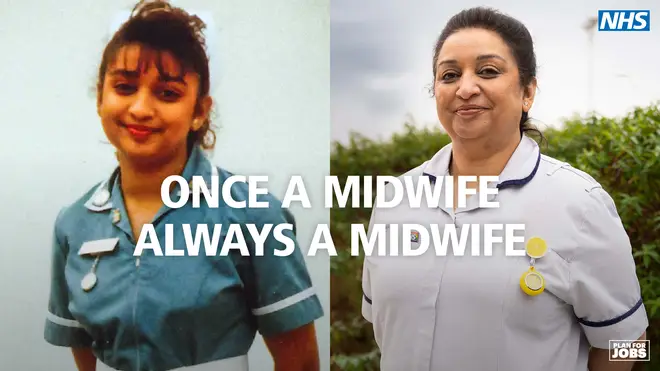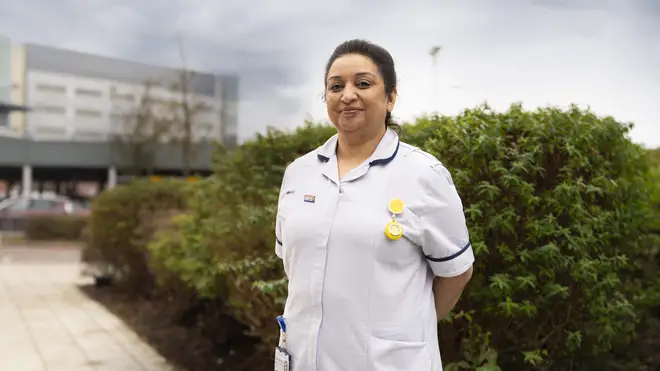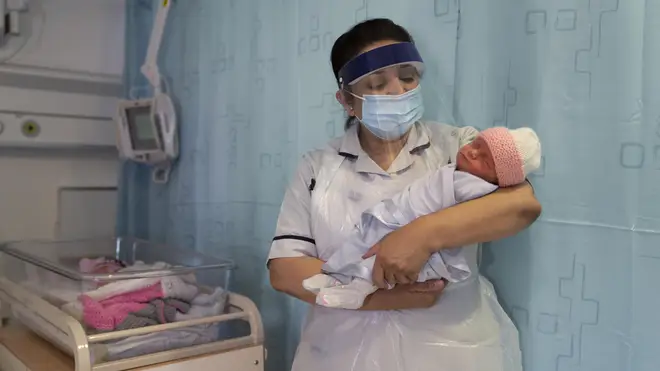On Air Now
Heart Breakfast with Jamie Theakston and Zoe Hardman 6:30am - 10am
17 March 2022, 10:47
 Promoted by NHS
Promoted by NHS

Daksha Mistry is one of the many midwives who returned to the NHS through a Return to Practice course.
A midwife who came back to the NHS after a 20 year break from the profession has opened up about her emotional return.
Daksha Mistry fell in love with midwifery when doing her training in the late 1980s, and describes the ability to help mums and babies as a "very precious and very privileged position to be in".
Sadly, she had to leave the profession 21 years ago because one of her children was ill.
"He had a chronic condition, so was in and out of hospital a lot," she tells Heart. "So I made the decision that I needed to look after him with my family. The intention was always to come back."
Daksha discovered the Return to Practice course, which helps nurses and midwives return to the NHS. Other routes you can take are Readmission (which you can do if you meet the NMC requirements) or by taking the the NMC Test of Competence (which is a mix of an online and practical test).
If you're a midwife considering returning to the NHS, here's how you can go about it.

There are many reasons why midwives return to the NHS. Some, like Daksha, will have been taking care of family, and others may have left for other reasons, or to start a new career.
For many midwives, a love of the job is ingrained in them and returning is a natural path for them to take. Midwives make such a huge difference in the lives of so many people, including Heart’s Amanda Holden, who has praised them for their incredible work.
Devastatingly, in 2010, Amanda lost her son Theo at 27 weeks. Three midwives - named Pippa Nightingale, Jackie Nash, and Natalie Carter - helped her through this unimaginable process.
“They were there for me and Chris (Hughes, Amanda’s husband) every step of the way - advising and putting their arms around us, taking questions from us like: ‘why did it happen?’, ‘how did it happen?’, ‘was it my fault?’ all of those horrible emotional things."
Around four months later, Amanda became pregnant with her daughter Holly, and they supported her throughout this time. After Holly was born, Amanda was in a coma for four months - and Pippa ended up saving Amanda’s life.
“I have never got enough to say that’s good enough about midwives," Amanda says. “I just think it’s the most amazing profession and a job I would do if I wasn’t doing what I do.”
Speaking about the importance of midwives returning to the NHS, Amanda said: “Midwives are special. There’s a huge need for them for young mums who are experiencing having a baby for the first time, or experienced mums.”
If you have a passion for midwifery and a desire to return to work, then the course could very well be perfect for you.
Daksha had a few reservations before starting the course, and told Heart that she was worried she'd be a 'dinosaur' as she'd been out of practice for so long.
She said that she was concerned about the technology side of things, and wondered if she'd be able to manage and cope with the new information.
Thankfully, though, she was able to learn on the job.
There are a variety of people at different stages who choose to do the course, so you needn't worry if you think you've been out of the job too long.
In fact, Daksha was actually able to help more junior midwives with her knowledge and experience - while they aided her in turn with the technology side.
"Despite the challenges out there, I am just so happy to be back on the wards," Daksha says.

The courses are available at universities and NHS organisations across the country. The length of the Return to Practice course varies depending on your individual needs.
You can find their list of approved programmes here.
If you choose to do a Return to Practice course, your fees will be paid and you’ll get an extra £1,000 for travel, childcare, and books. If you choose to do a Return to Practice course through a Trust, your fees will be paid and you’ll receive a salary or £1,000.
Ready to return to a role where you’ll make a real difference? Sign up to this email guide, and the NHS will help you find a way to come back that suits you, tell you what financial support you’re entitled to, and give you the opportunity to have a chat with a member of our team.
Find out more about Return to Practice on the NHS website
In 2018, Amanda Holden set up the fund Theo’s Hope, which aimed to provide much-needed bereavement counsellors in all maternity units around the UK. “There is never a 'cure' for the pain of losing a baby but you can be healed in a way that lets you get on with your life.”